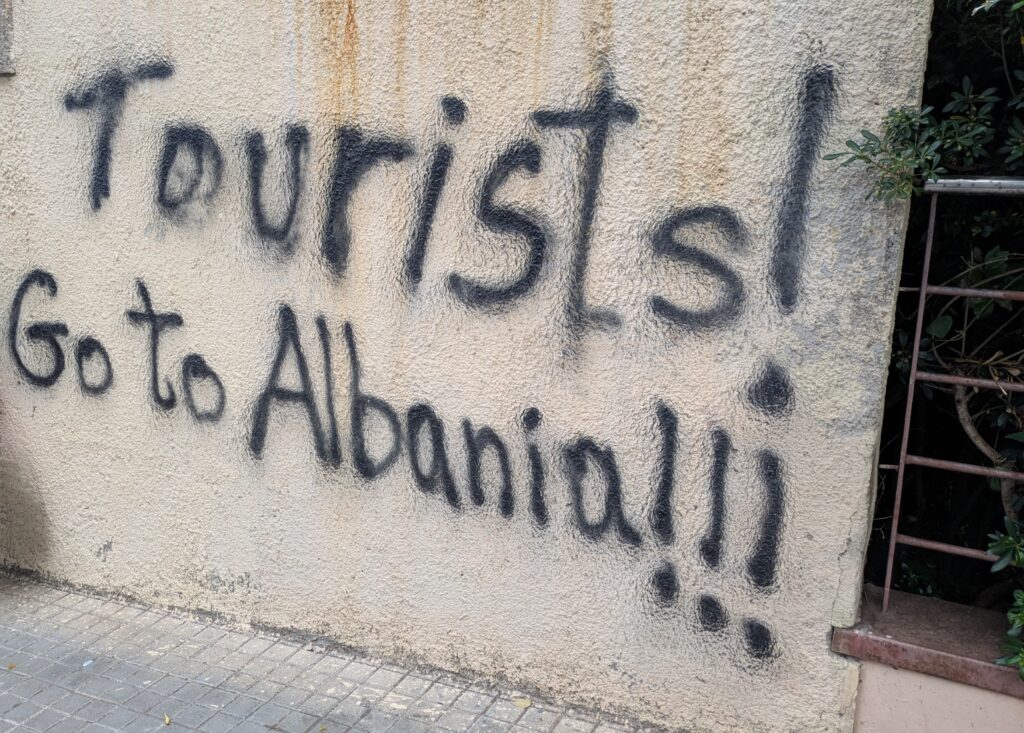“Tourists Go Home” – But Go Where, Exactly? Rethinking Sustainable Tourism in an Overcrowded Europe

I took this picture a few weeks ago in Barcelona. When I read about the anti-tourist protests engulfing the city, I thought I should jot down my thoughts.
Somewhere between the thousandth cruise ship docking in Venice and the fifteenth “authentic” tapas joint opening on your street, a threshold gets crossed. It’s hard to say exactly when it happens, but locals feel it in their bones: this place is no longer for us.
From Barcelona to Dubrovnik, an anti-tourist backlash is brewing—and frankly, I get it. But I also find myself stuck in a strange place. I love to travel. I write blogs while on holiday. I crave local food and cultural immersion, just like everyone else claiming to be “not that kind of tourist.”
But here’s the uncomfortable truth: I am that kind of tourist. So are you.
So what does sustainable tourism actually mean in this era of mass movement, Airbnb takeovers, and Instagram-fuelled bucket lists? Is it just greenwashing on a jet engine? Or can tourism be made to work—for both locals and visitors—without killing the soul of the very places we’re trying to enjoy?
Let’s unpack this.
The Numbers Don’t Lie (But They Don’t Tell the Whole Story)
Take Spain. In 2024, it clocked over 85 million visitors. Barcelona alone received more tourists than it has residents—many times over. The result? Soaring rents, disappearing long-term rentals, and a creeping sense of dispossession.
So what have governments done? Venice introduced a €5–€10 entry fee for day-trippers. Amsterdam is slashing cruise ship slots. Barcelona has gone further: it plans to ban all short-term tourist flats by 2028. Bold? Yes. Enforceable? We’ll see—illegal listings spiked during the last moratorium.
But these are largely reactive measures, tinkering at the edges of a much deeper structural question: what kind of tourism do we actually want?
“Sustainable Tourism” Is Not a Vibe
The term gets thrown around a lot—usually in brochures with trees and smiling villagers. But if we take the UNWTO at its word, sustainable tourism means minimising environmental damage, preserving local culture, and ensuring economic benefits reach host communities. Sounds great. Almost utopian.
But here’s the catch: the core model of tourism—cheap flights, mass accommodation, high turnover—is fundamentally extractive. You fly in, you consume, you leave. Often, so does the profit.
What we should be aiming for is not just “sustainability” but regeneration—tourism that leaves a place better than it was. Some European destinations are experimenting with “regenerative itineraries”—think: one hour of volunteering or rewilding for every leisure hour. It’s early days, but it hints at a mindset shift.
Regenerative tourism isn’t theory—it’s action. When PM Narendra Modi picked up litter on a Mamallapuram beach during a diplomatic visit in 2019, it symbolised a powerful shift: from consumer to caretaker. What if every tourist left a place cleaner, richer, or more connected than they found it?
Can the Free Market Save Us?
Let’s be honest: markets are amazing at scaling experiences, but terrible at pricing externalities. When landlords realise they can make 3x renting to short-stay visitors, locals get priced out. When airline tickets are cheaper than train rides, carbon emissions skyrocket.
Dynamic pricing (entry fees that vary by time or crowd size) and congestion taxes can help shift demand. Alpine parks are even experimenting with tradable visitation permits—like carbon credits for tourists. It’s niche now, but not far-fetched.
The real issue? Tourism is full of “tragedy of the commons” problems. Public spaces, cultural ambience, local goodwill—these aren’t priced, but they’re very much consumed.
Outside-the-Box Ideas (That Deserve Inside-the-Room Discussion)
Since we’re not shy of big ideas here, let me float a few provocations:
- Carbon Passports: Each citizen gets a yearly CO₂ budget. Want that third long-haul flight? Buy someone else’s unused allowance, or offset heavily. It’s radical, but the tech exists.
- Blockchain Visitor Caps: Issue time-stamped digital entry tokens for high-traffic cities. Once the cap is hit, fees surge—and revenue goes to public transport or resident benefits.
- AI-Powered Tourist Nudging: Real-time crowd data + incentive apps (like Copenhagen’s “CopenPay”) that redirect tourists to lesser-known spots with discounts or gamification.
- Tourism Co-ops: What if locals owned the guesthouses and tour services—and profits funded local housing or schools? A few Galician villages are piloting this already.
These aren’t silver bullets. But they acknowledge what the current model refuses to: tourism is a political economy, not just an economic sector.
Things We Don’t Talk About Enough
- Who gets to travel when quotas rise? If we price people out with taxes, are we just turning travel into a luxury good?
- What about climate adaptation? As Mediterranean summers become too hot, will tourist flows shift north—leaving behind economic wreckage?
- How do we measure success? Visitor arrivals are a crude metric. We need indicators like resident satisfaction, visitor-day carbon footprint, and cultural vitality.
And let’s not forget the new grey zone: digital nomads. Are they tourists? Residents? Economic assets or real estate parasites? No one’s quite sure—and that ambiguity is being exploited.
So What Now?
We need to move beyond the binary of “tourism is good” vs. “tourists go home.” That framing is lazy. The real question is: how many tourists, what kind of tourists, and who decides?
Governments need to build enforcement capacity—not just write policy briefs. Platforms must be regulated, not placated. And locals should have veto power over what’s done in their name.
Tourism isn’t going away. Nor should it. Done well, it fosters empathy, funds preservation, and celebrates the human urge to explore. But done badly, it hollow outs homes, alienates residents, and turns heritage into Disneyland.
If we don’t reimagine it now, the backlash will do it for us.
And when the tourists really are gone—we might just miss them.